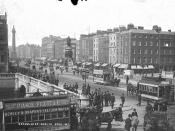1
As a member of the EU from 1973, Ireland has gradually conformed to EU standards on the treatment of women. EU membership has opened Ireland to the world, helping to change attitudes on a number of social issues. While EU influence has grown, the influence of the Roman Catholic Church has begun to diminish. In 1972 a clause recognizing the "special position" of the Catholic Church in Irish society was removed from the constitution. Since then, the Church has continued to play a large role in politics, but not always successfully. So far, it has convinced Irish voters to uphold restrictions on abortion, but it failed in its efforts to keep divorce illegal. Social, political, economic, and cultural changes have combined to open up opportunities for women. After a long struggle, the right of married women to work outside the home was guaranteed. The employment of women has risen steadily.
Much of that increase came during the 1990s, when an Irish economic boom produced a need for more workers. Yet women in Ireland still face inequities. Men earn more than women do, and they have greater access both to living-wage jobs and to high-paying management jobs. Twenty-first century Ireland is a fast changing society. Ireland is becoming a truly multi-ethnic society. According to preliminary results from Census 2006, immigrants now make up nearly ten percent of the population. This essay will discuss the issues facing the women in minority groups in modern Ireland. The minority groups considered for this essay will be Irish traveller women and migrant women. The term 'migrant women' includes not only recent immigrants and refugees but also those who have temporary status as visitors, tourists, temporary workers, students and undocumented migrants. It also includes those Irish citizens and permanent residents who may have been in...


